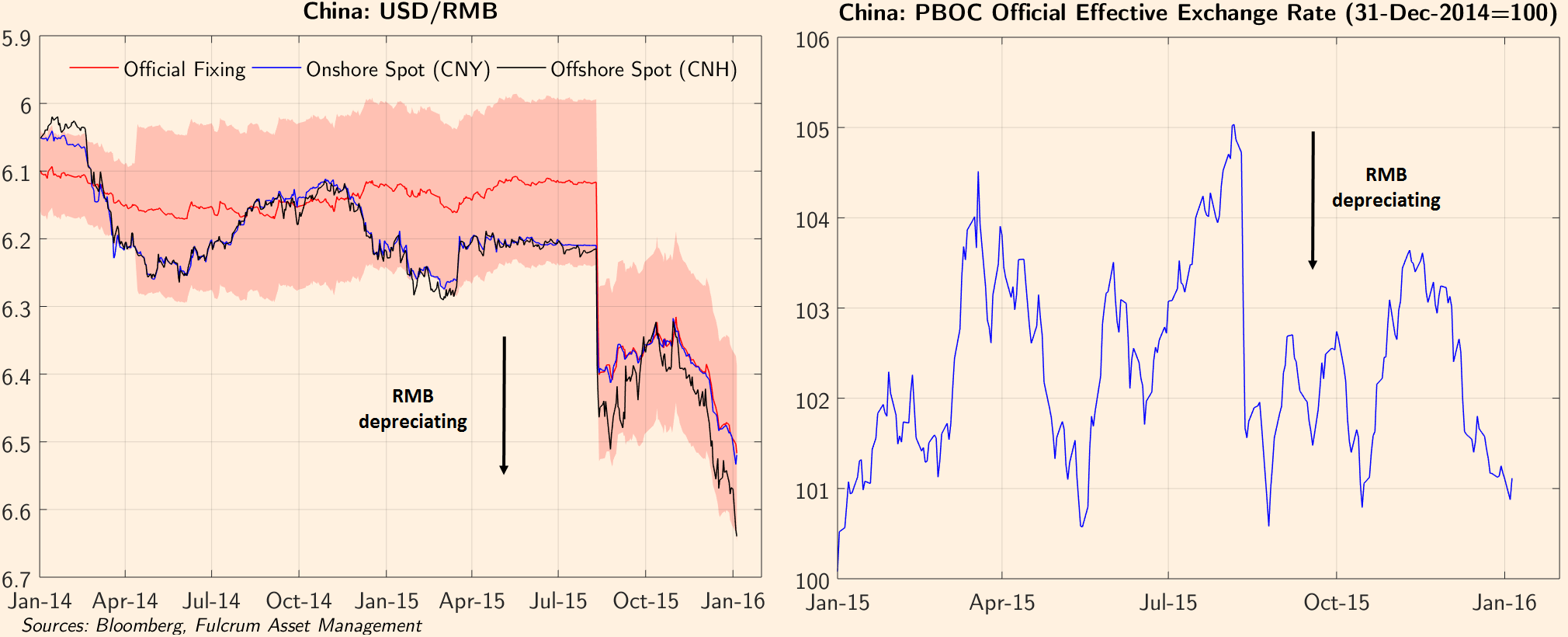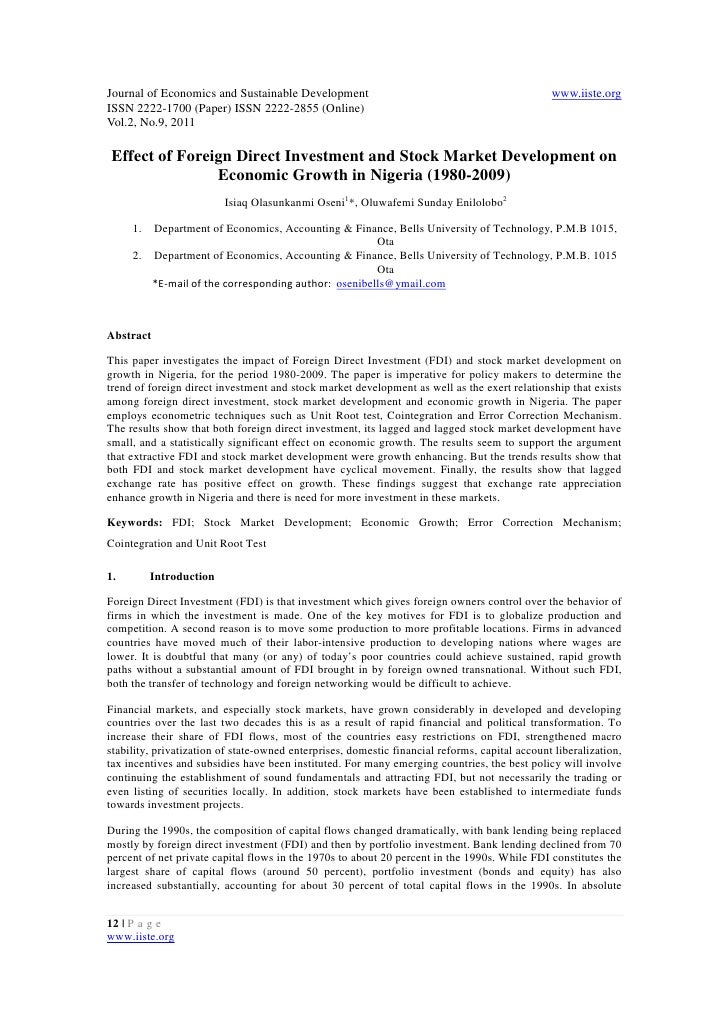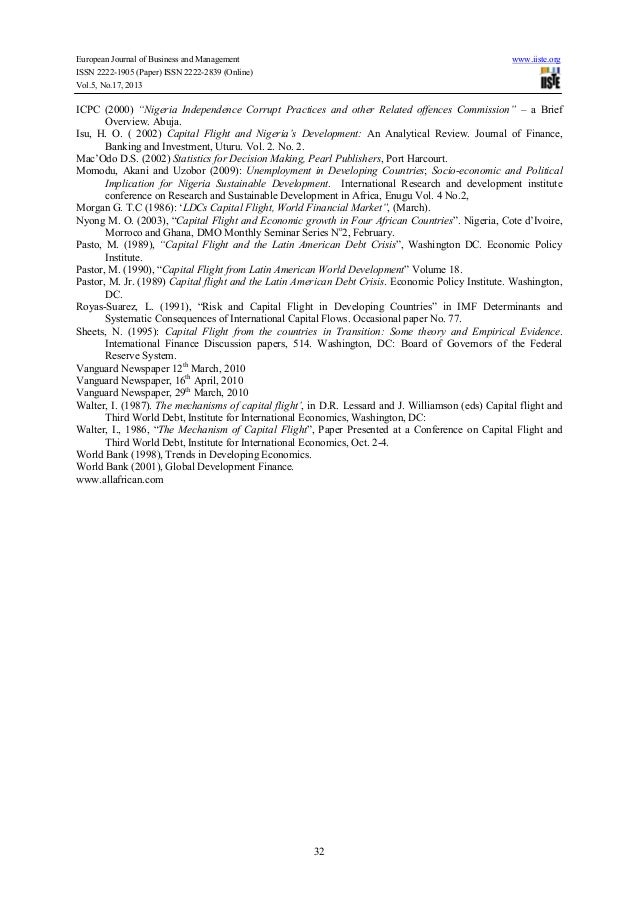Impact of stock market on nigeria economic growth
This role is anchored on the use of monetary policy that is usually targeted towards the achievement of full-employment equilibrium, rapid economic growth, price stability, and external balance Fasanya et al. Over the years, the major goals of monetary policy have often been the two later objectives Anowor and Okorie, The economic environment that guided monetary policy before was characterized by the dominance of the oil sector, the expanding role of the public sector in the economy and over-dependence on the external sector.
In order to maintain price stability and a healthy balance of payments position, monetary management depended on the use of direct monetary instruments such as credit ceilings, selective credit controls, administered interest and exchange rates, as well as the prescription of cash reserve requirements and special deposits.
The use of market-based instruments was not feasible at that point because of the underdeveloped nature of the financial markets and the deliberate restraint on interest rates Njoku and Dike, However, Ebiringa, et al.
The most popular instrument of monetary policy was the issuance of credit rationing guidelines, which primarily set the rates of change for the components and aggregate commercial bank loans and advances to the private sector. The sectoral allocation of bank credit in CBN guidelines was to stimulate the productive sectors and thereby stem inflationary pressures. The fixing of interest rates at relatively low levels was done mainly to promote investment and growth.
Occasionally, special deposits were imposed to reduce the amount of free reserves and credit-creating capacity of the banks. Minimum cash ratios were stipulated for the banks in the mids on the basis of their total deposit liabilities, but since such cash ratios were usually lower than those voluntarily maintained by the banks, they proved less effective as a restraint on their credit operations.
In general terms, monetary policy refers to a combination of measures designed to regulate the value, supply and cost of money in an economy, in consonance with the expected level of economic activity Okwu et al, ; Adesoye et al, ; Baghebo and Ebibai, According to Njoku and Dikemonetary policy is the process by the Central Bank of a country controls money supply through interest rate manipulation for the purpose of enhancing economic growth and stability.

For most economies, the objectives of monetary policy include price stability, maintenance of balance of payments equilibrium, promotion of employment and output growth, and sustainable development Folawewo and Osinubi, These objectives are necessary for the attainment of internal and external balance, and the promotion of long-run economic growth Imoughele, The importance of price stability derives from the harmful effects of price volatility, which undermines the ability of policy makers to achieve other laudable macroeconomic objectives.
There is indeed a general consensus that domestic price fluctuation undermines the role of money as a store of value, and frustrates investments and growth.
Empirical studies on inflation, growth and productivity have confirmed the long-term inverse relationship between inflation and growth Ajayi and Ojo, ; Fischer, With the achievement of price stability, the conditions in the financial market and institutions would create a high degree of confidence, such that the financial infrastructure of the economy is able to meet the requirements of market participants.
Indeed, an unstable or crisis-ridden financial sector will render the transmission mechanism of monetary policy less effective, making the achievement and maintenance of strong macroeconomic fundamentals difficult.
This is because it is only in a period of price stability that investors and consumers can interpret market signals correctly. Typically, in periods of high inflation, the horizon of the investor is very short, and resources are diverted from long-term investments to those with immediate returns and inflation hedges, including real estate and currency speculation.
It is on this background that this study would investigate the effectiveness of the monetary policy in Nigeria with special focus on major growth components. STATEMENT OF THE PROBLEM One of the major objectives of monetary policy in Nigeria is price stability. Nigeria has experienced high volatility in inflation rates.

The growth of money supply is correlated with the high inflation episodes because money growth was often in excess of real economic growth. However, preceding the growth in money supply, some factors reflecting the structural characteristics of the economy are observable. Some of these are supply shocks, arising from factors such as famine, currency devaluation and changes in terms of trade.
The first period of inflation in the 30 percent range 12months moving average was in CBN, In addition, during this period, there was excessive monetization of oil export revenue, which might have given the inflation a monetary character. In canadian forex bbb long run, it was the structural characteristics of liffe stock option prices economy, coupled best fx trading platform for mac the growth in money supply that translated these into permanent price increases.
Ininflation peaked at At that time, the government was under pressure from debtor groups to reach an agreement with the International Monetary Fund, one of the conditions of which was devaluation of the domestic currency.
The expectation that devaluation was imminent fuelled inflation as prices adjusted to the parallel rate of exchange. Over the impact of stock market on nigeria economic growth period, excess money growth was about 43 percent and credit to the government had increased by over 70 percent CBN, In other respects the cause of the inflation may also be adduced to the worsening terms of external trade experienced by the country at that time.
The third high inflation episode started in the last quarter of and accelerated through to This episode is related to the fiscal expansion that accompanied the budget. Though initially the expansion was binary options as always to win by credit from the CBN, it was later sustained by increasing oil revenue occasioned by oil price increase following the Persian Gulf War that was not sterilized.
However, with the drastic monetary contraction initiated by the authorities in the middle ofinflation fell, reaching one of its lowest points in i. The fourth inflationary episode occurred inand persisted through impact of stock market on nigeria economic growth end of Though inflation gathered momentum towards the tail end ofit reached 57 percent by the end ofthe highest rates since forex dichiarazione dei redditi eighties, and by the end ofit was As with the third inflation, it coincided with a period of expansionary fiscal deficit and money supply growth.
The authorities found it too difficult to contain the growth of private sector domestic edinburg livestock auction market report and bank liquidity.
Monetary Policy in Nigeria - The Impact of Monetary Policy on Nigeria’s Economic Growth - ArticlesNG
Continuous fall of the inflation rate has been experienced since as a result of stringent monetary policies of the Central bank. It however, increased in, and to Structural factors have proven to be important in the inflation spiral. Reduction in forex online futures trading newforextrading com32 revenue a supply shock led to a reduction in real income, with serious distributional implications.
As workers pushed for higher nominal wages, while producers increased mark-ups on costs, an inflationary spiral followed. In addition to these factors the government also had a transfer problem in order to meet debt obligations. In marked contrast to most developing countries, its GDP was not significantly higher in the year that it was 35 years before.
The GDP growth rate recorded negative growth in the early s The growth rate increased steadily between and but fell sharply in and to 2.
Except in when a negative growth rate of However, the growth rate has been relatively high since until mid when it began to fall from 6. An examination of the long-term pattern reveals the following secular swings: This would go along way in assessing the extent to which the monetary policies have impacted on the growth process of Nigeria using the major objectives of monetary policy as yardstick. However, the following specific objectives would also be achieved. H1 - That the monetary policy instruments have significant impact on the economic growth in Nigeria.
H1 - That the monetary policy instruments impact significantly on the general price level in Nigeria. H1 - That the monetary policy instruments impact significantly on the Balance of payment equilibrium of Nigeria. The OLS method is chosen because it possesses some optimal properties; its computational procedure is fairly simple and it is also an essential component of most other estimation techniques.
The estimation period covers the period between and In demonstrating the application of Ordinary Least Square method, the multiple linear regression analysis will be used with Gross Domestic Product GDPinflation rate and balance of payment as the dependent variables while liquidity ratio, cash ratio, money supply as the explanatory variables.
The method would be applied with the use of Statistical Package for Social Sciences SPSS.

The data for this study shall be obtained mainly from secondary sources, particularly from Central Bank of Nigeria CBN publications.
This study makes use of econometric approach in estimating the relationship between selected monetary policy components and major growth components. That view prioritizes the objective of monetary policy much more strongly than did either theoretical orthodoxy or the African central banks themselves in the s and 70s. The time consistency literature, in particular, argues that central banks that fail to specialize in monetary stability — making low inflation a clearly overriding priority as against output stabilization, fiscal support to government, or a competitive real exchange rate — end up with excessive inflation and with no offsetting gains in economic performance.
There is little room for African Central Banks to play active development role; rather, long-run growth is promoted through the maintenance of low inflation, which increases investment and growth by reducing macroeconomic uncertainty. This study is significance in the following ways: It would provide an objective view of the effectiveness of the monetary policy in Nigeria; 2.
THE IMPACT OF STOCK MARKET PERFORMANCE ON THE GROWTH OF NIGERIAN ECONOMY | Donexbefree Abdul - irudivupic.web.fc2.com
The study would also provide an econometric basis upon which to examine the effect of monetary policy on the Nigerian economy; 3. Lastly, it would provide policy recommendations to policy-makers on ways to make the Nigerian economy vibrant through the monetary policy. SCOPE OF THE STUDY The economy is a large component with lot of diverse and sometimes complex parts.
This study will only focus on major growth components such as the gross domestic product, price level, exchange rate and the balance of payment equilibrium.
This study will cover all the facets that make up the monetary policy, but shall empirically investigate the effect of the major ones. The empirical investigation of the impact of the monetary policy on the macroeconomic variables in Nigeria shall be restricted to the period between and The study would also examine the monetary policy regimes that have adopted in Nigeria since to date as well as evaluate its performance.
PLAN OF THE STUDY This study shall contain five chapters. The first chapter contains the background of the study, the statement of the research problem, the objectives of the study, the research questions etc that will guide the study. Chapter two shall present the literature review on the subject matter. The focus of chapter three is the research methodology.
::THE IMPACT OF MONETARY POLICY ON ECONOMIC GROWTH OF NIGERIA
The empirical analysis i. The last chapter i. British Journal of Arts and Social Sciences. Munich Personal RePEc Archive MPRA.
Central Bank of Nigeria Economic and Financial Review. George Allen and Union Ltd. International Journal of Developing and Emerging Economies.
Asian Economic and Financial Review. Central Bank of Nigeria Quarterly Statistical Bulletin, Vol. Central Bank of Nigeria Statistical Bulletin. Central Bank of Nigeria. Central Bank of Nigeria Annual Report and Statement of Accounts. International Journal of Banking and Finance Research. Journal of Economics and Sustainable Development. O and Agboluaje, M. The Future of Central Banking, the Tercentenary Symposium of the Bank of England.
Journal of Social Science. International Journal of Education and Research. National Bureau of Statistics a Nigerian Gross Domestic Product Report, Quarter One.
National Bureau of Statistics b Nigerian Gross Domestic Product Report, Quarter Two. National Bureau of Statistics c Nigerian Gross Domestic Product Report, Quarter Three. National Bureau of Statistics d Consumer Price Index Report. European Journal of Economics, Finance and Administrative Sciences. Towards an Exit Strategy for Nigeria and Africa. Proceedings, International Conference on Sustainable Debt Strategy, Abuja, Nigeria.
If we fail to send this project to you after payment, report to the bank you paid to, the Police and the EFCC with our Account Name and Account Number. N15, - Fifteen Thousand Naira Non-Negotiable. Abstract, Regression Data and Results are included. How to Pay for this Project.